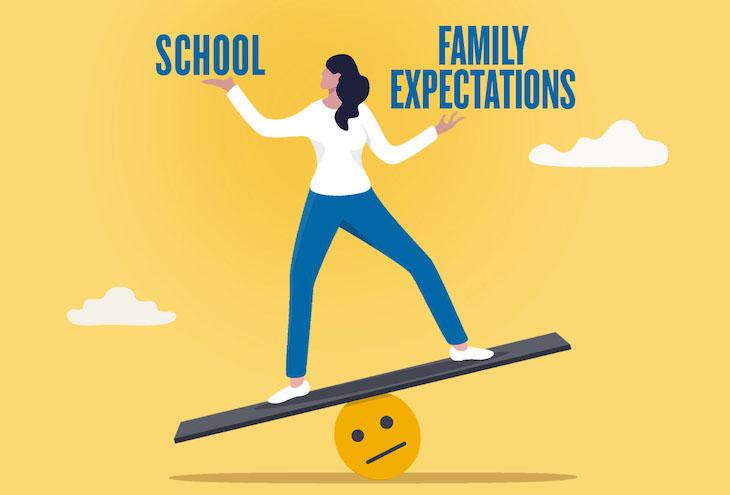As a child, your goals and expectations may closely align with your parents’. As you get older, you may find that your personal goals begin to differ from your family’s expectations. When that happens, it can create tension in your relationship with your family, and your parents in particular. Here are a few tips to help balance family expectations with your personal goals.
Clearly Separate Your Goals from Their Expectations
Many students hear from a young age that they need to go to college. Some are told they need to become a doctor or lawyer. Or that they need to be able to support themselves as soon as they complete college. After hearing these things so often, it may become difficult for students to separate their goals from their parents’ expectations. Take a step back and really look at what you want to do and accomplish in life. Identify what you want, not necessarily what you think your parents expect. It will be much harder to be happy long term if you don’t have clear ownership of your goals.
Help Them Understand Where You Are Coming From
While it may be difficult to share your goals with your parents — especially if your goals don’t align with their expectations — it’s a necessary step forward. It’s possible that your parents may not support your goals because they don’t fully understand them. For example, they may not realize that traveling the world for a year after graduating is your way of preparing yourself for a career addressing global issues like climate change, and that you are going to blog about your experiences to create a portfolio. Perhaps you will even consider an advanced degree when you finish traveling. Without context, your parents may not fully understand the extent of your goals and the plans you have in place to succeed. Sharing that information will help them to understand, and hopefully support, your goals.
Parents and children don’t always see eye to eye, and that’s OK. Instead of getting upset, channel your energy into creating a more cohesive plan to accomplish your goals. Getting defensive may lead to arguments with your parents, making it harder for your parents to see your point of view and, ultimately, support your goals.
Some parents want to live vicariously through their children, or have their children live out the dreams they had for themselves but weren’t able to bring to fruition. Make it clear to your parents that you are not them. Your job is to determine your own goals and dreams and work to make them a reality.
It’s easy to feel that you owe your parents, or that you will let them down if you don’t meet their expectations. At the end of the day, though, you need to do what makes you happy. Your parents will likely be supportive once they understand how important your goals are to you.
Remember Their Good Intentions
Remember, your parents truly do want the best for you. They want you to live a happy and fulfilled life. At times it may seem like they are being unfair or hard on you. Maybe they are. But it’s more likely that they are trying to do what they think is best for you. While their expectations may not necessarily align with your own goals, it doesn’t mean they love you any less.
Balancing family expectations with your personal goals can be challenging, intimidating, and stressful. It may require some honest and uncomfortable conversations. But it doesn’t have to be a source of contention. Take the time to help your family understand your goals, and why they are important to you. Let them see that you are your own person, and while you value what they have done for you, you need to follow your own path. Ultimately you and your family want you to succeed, at whatever your goals may be!
 On Topic
On Topic
Kimberlee Blevins is an enrolled member of the Mandan Hidatsa Arikara Nation from the Fort Berthold Indian Reservation; and a descendent of the Hunkpapa Lakota. She was born into the Ciicga Clan. Her traditional name is Sunlight Woman. Blevins, who serves as the AISES Region 5 Student Representative, is currently finishing her MS in environmental science with a concentration on air quality in tribal communities at Sitting Bull College. She earned a BS in environmental science and two associate degrees in pre-engineering and Native American leadership from United Tribes Technical College. Blevins is focused on tribal land restoration and environmental policy. Her passion is working on STEM outreach and inspiring tribal youth.
What should students keep top of mind when working toward a goal that might not be understood or accepted by family members?
Students should keep in mind both their passion and their boundaries. There have been so many times when I’ve been torn between commitments to school and family. It has been an inner battle.
I have two main takeaways from my academic career. The first is to practice time management. I love my schoolwork just as much as I love my family, and having time for both keeps me centered and motivated. The second is that it’s OK to say no to family. The first time you say no will be hard — there may even be hurt feelings on both sides. Ultimately, though, your family loves you and wants to see you succeed. They’ll come around and recognize your priorities.
My final recommendation is for students to always keep their passion in mind. Remind yourself why you are pursuing this path or this goal. For me, I remind myself that I am going on a journey to decolonize the STEM field and infuse it with Indigenous energy.
Remember, nothing worth doing ever comes easy.














